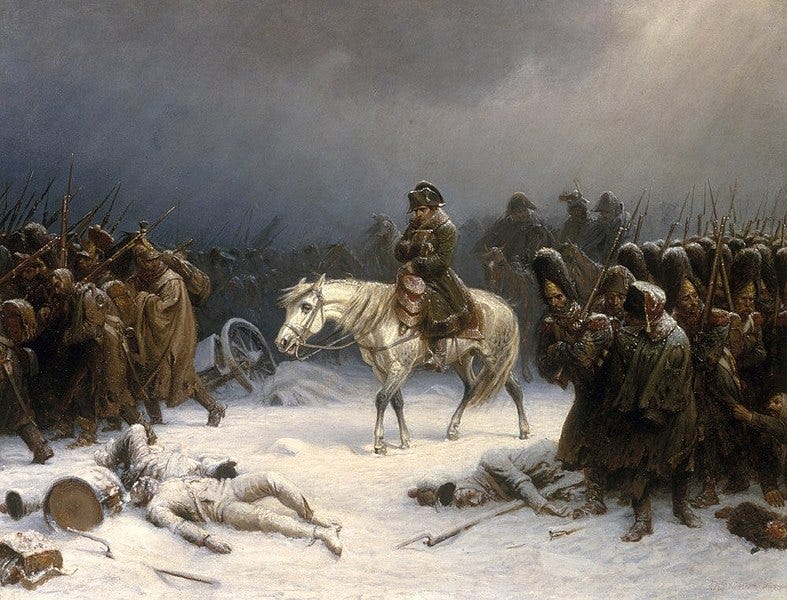Hacking for Defense and Lessons Learned from the French Invasion of Russia
A Lesson from History to Help H4D teams avoid disaster and answer, “what resources do we need to learn about our problem and develop and deploy our solution?"
Napoleon and his Army of 600,000 men marched on Russia in June of 1812. The goals were to punish Tsar Alexander I for defying Napoleon's blockade against Britain and to demonstrate France’s might. Napoleon believed the campaign would result in swift and decisive victory. Instead, it was one of the most devastating military endeavors in history.
The French army advanced rapidly into Russia. Napoleon was aware of the importance of resources, stating their importance in his famous quote that, “An army travels on its stomach.” Yet despite his understanding of logistics and the importance of resources, the further they went, the more their supply lines stretched thin.
The Russians fought hard, but the logistical challenges, such as the vast distances, poor roads, and harsh weather conditions killed more soldiers than battle. Resupply was nearly impossible which exacerbated the unexpectedly harsh Russian winter. The absence of adequate shelter and supplies weakened the army’s effectiveness on the battlefield. Food shortages began as the Russians burned their own land, leaving nothing for foraging, denying the French the supplies they so desperately needed. Napoleon’s meager provisions were raided by Cossacks using guerrilla tactics. The raids broke the supply lines, created transportation problems, and inhibited Napoleon from sustaining his army. Provisions dwindled. Men grew hungry and ate their horses. Starvation and disease spread. Men deserted. Napoleon's army struggled to maintain their strength.
Only 100,000 of Napoleon’s men made it to Moscow where the city was empty, burning, and devoid of resources. There was no victory. His once grand vision of conquest disintegrated as his men succumbed to the relentless Russian landscape and the logistical nightmare it imposed. The French retreat began soon after its arrival. Napoleon returned to Europe defeated with only 40,000 men.
Napoleon’s retreat from Russia; oil on canvas painting by Adolph Northen, 1851 (Public Domain).
Napoleon's invasion failed principally due to logistics and the lack of resources. The failure serves as a poignant lesson in military history, highlighting the critical importance of logistics in warfare and the substantial impact it can have on the outcome of a campaign. The failure also serves as a warning to hackers: Key Resources are the lifeblood of the H4D process. Without resources, H4D teams cannot perform the activities required to deliver impactful solutions to their Beneficiaries.
This chapter is designed to help H4D teams avoid disaster and answer “what resources do we need to learn about our problem and develop and deploy our solution?” Most hackers usually answer “money!” but, as they soon learn, financial resources are neither the most important resource to H4D teams nor sufficient for developing and delivering and sustaining a solution.
The Hacking for Defense program at Stanford University has created 20 startups that have generated 660 jobs and raised more than $350 million. To learn more about the H4D course at Stanford University, visit h4d.stanford.edu; to learn more about H4D around the world, visit h4d.us. To read excerpts of the NEW upcoming H4D textbook, subscribe to the H4D Stanford Substack at stanfordh4d.substack.com



